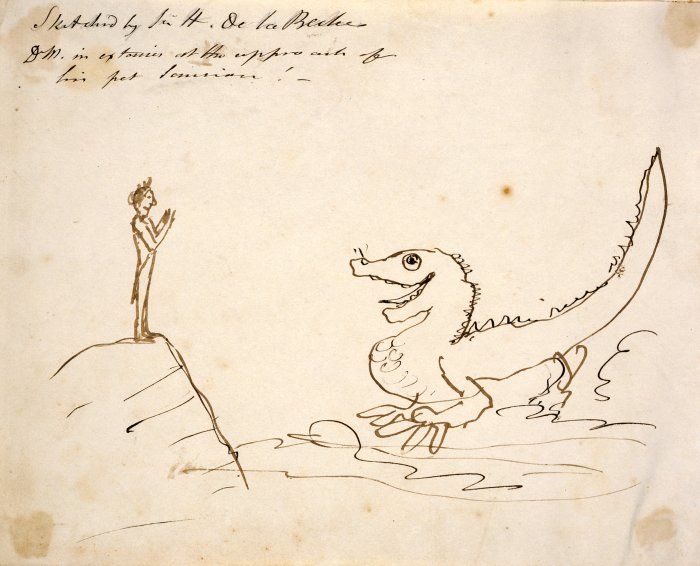Imagine you’re stuck in the desert, your plane has crashed and you’re trying hard to fix it. Then a child pops up out of the blue and asks you straight out “If you please – draw me a dino…”. Now let’s say you do as Antoine de St-Exupéry and take up the challenge without asking too many questions. How would you draw that dino? I guess it depends on when you were asked the question.
Let’s go back through the history of drawing dinosaurs. The pictures I grew up with were the ones from Jurassic Park who came directly from the last dino-revolution started by Ostrom and Bakker‘s work (especially with the publication of Dinosaures Heresies, in 1986). This vision was then heavily popularized by the three (nearly four?) blockbuster movies we all know and love…
Since the late 1990’s, the increased availability of formerly highly expensive techniques such as CT scans or synchrotrons, has helped to understand dinosaurs better than ever. Led by new discoveries from vast, previously unexplored deposits, some of the most interesting work from recent times shows an even closer link between birds and dinos than we previously thought (see last week’s Science NOW). So I believe (and hope) that the next generation will grow up with the pictures of dino-chickens and see their lunch time chicken wings as true theropod meat…
It is always really interesting to look at all the work that has been done and presented to the public through dinosaur pictorial art; from the weird/funny starts in the first half of the 19th century to the modern, highly accurate representations of today (the French artist Alain Bénéteau is just one example among many). As a nice example, have a look at the pictorial evolution of the second oldest scientifically described dinosaur: the Iguanodon.
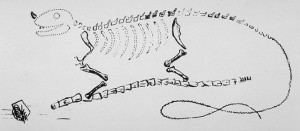
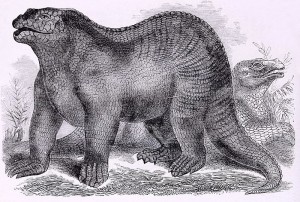
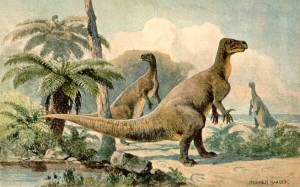
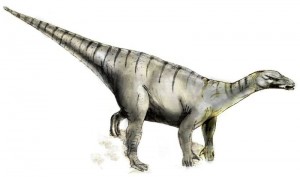
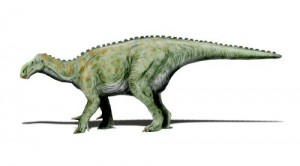
But here I’d like to emphasize my love for what I think was the “golden age” of dinosaur pictorial art. I obviously want to refer to the work of artists like Charles R. Knight (1874:1953), Zdeněk Burian (1905:1981 – have a look at this awesome online gallery) or Rudolph F. Zallinger (1919:1995). Their beautiful and (for their time) highly accurate scientific artwork was crucially import for bringing palaeontology into the public eye. This “golden age” was made possible by the upgrading of palaeontology to the status of a true science and the general acceptance of Darwin’s theory. Public interest in palaeontology at this time was also fueled by new fossil discoveries from expanding European colonies and the American frontier eventually leading to the most epic palaeo-story ever: the Bone Wars (soon to be seen on HBO)!
I refer to this period (second half of the 19th century and first half of the 20th) as a “golden age” but that does not mean that it was the peak of palaeontological discovery or interest. Our palaeo-knowledge has never been richer. Dinosaurs are no longer merely unknown beasts from an ageless past. They are now placed in accurate phylogenetic frameworks and are just one of the many extinct tetrapod groups which we can now link to extant biodiversity. However, identifying birds as living remains of the dinosaur lineage does diminish dinosaurs’ mightiness. They are no longer the perfect romantic group of fossils: giant monsters that ruled the earth for over 150 million years before being completely wiped out by a single meteorite that cleared the way for us to evolve and exist. Even if I actively try to fight against this simplistic view of the History of Life, I have to admit that it is the one that brought me into palaeontology, not the chickens I used to keep in my parents’ garden… So, although I have no drawing talent whatsoever, because I think that dinosaurs are still awesome but lacking the mightiness they deserve, I’ll draw that little prince something like this:
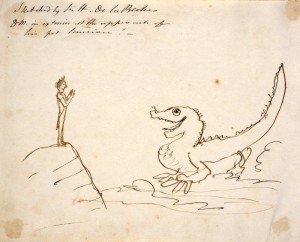
Author
Thomas Guillerme: guillert[at]tcd.ie
Photo credit
Wikimedia commons

